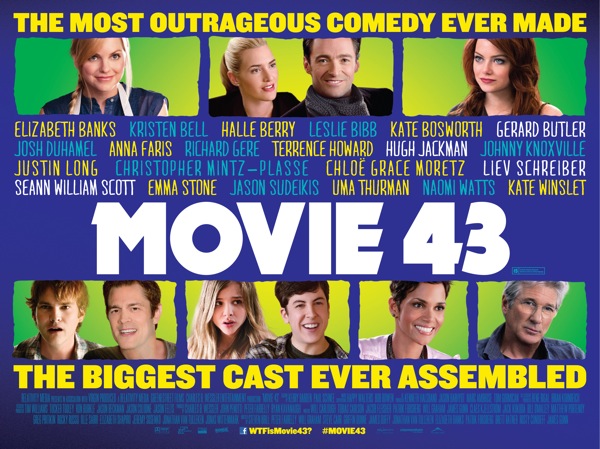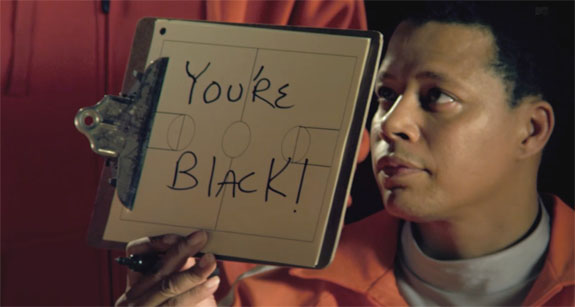
In the tradition of KENTUCKY FRIED MOVIE, THE GROOVE TUBE and AMAZON WOMEN ON THE MOON comes MOVIE 43, a chaotic assemblage of raunchy, star-studded sketches aimed squarely at your inner twelve-year-old. Produced by Peter Farrelly and Charles Wessler, and featuring contributions from directors like James Gunn, Steven Brill, Griffin Dunne, Elizabeth Banks and Rusty Cundieff, its sole intent is to give you a rambunctiously entertaining ninety minutes at the movies. That's it. There's no real plot to follow, no underlying themes of Great Social Importance, and absolutely no restraint.
As someone who can still recite the "Catholic High School Girls in Trouble" trailer verbatim, this is my type of movie. And of the many directors involved, Rusty Cundieff is definitely my guy. This year marks the twentieth anniversary of his hilarious FEAR OF A BLACK HAT, which appropriates the the THIS IS SPINAL TAP mockumentary model to skewer hip-hop stereotypes. It's a spot-on parody, much of which still holds true today; only the designer labels and quality of drugs have changed. A decade later, Cundieff would serve as director on one of the greatest sketch-comedy shows of all time, CHAPPELLE'S SHOW.
Cundieff's MOVIE 43 segment, "Victory's Glory", would've been right at home on an episode of CHAPPELLE'S SHOW. The premise: basketball coach Terrence Howard inspires his team to victory over their lily-white opponent by appealing to their blackness. It's an easy joke, sure, but in the hands of a skilled satirist, it's also a good one. I talked to Cundieff briefly last week about his short, and his thoughts on FEAR OF A BLACK HAT twenty years later.

Mr. Beaks: One of the most influential films in my life, in a lot of ways, is KENTUCKY FRIED MOVIE. I like that this film is trying to recapture not only the chaotic, sketch-comedy format of that movie, but also its profound sense of wrong. Was that a formative film for you as well?
Rusty Cundieff: I remember KENTUCKY FRIED MOVIE. I don't know if I'd call it formative, because I don't know that my brain was ready to be formed yet. But I remember the film - and also THE GROOVE TUBE, which was another sketch thing that came along at that time. I've always liked sketch comedy, and have been involved in it in different ways. But I would definitely say that KENTUCKY FRIED MOVIE was the precursor to this, and for whatever reason - probably because of the internet and television - you don't see too many movies that follow this format anymore.
Beaks: I haven't seen your full sketch yet, but it seems like it's basically the pre-game speech they gave in the other locker room in HOOSIERS.
Cundieff: (Laughs) It definitely has a HOOSIERS feel to it. I haven't heard it described that way, but that's pretty accurate. It's the team that would've been playing that team in Indiana - although this doesn't take place in Indiana. And Terrence really went balls-to-the-wall with it.
Beaks: Obviously, you had a script, but how much of this is just playing around with different takes? And as you're shooting it, are you thinking, "Man, we're getting great stuff, and I know I'm going to have to lose a lot of it?"
Cundieff: The producers came to me. They had a script by [Rocky Russo and Jeremy Sosenko]. We talked, and I had them add a few ideas I had. And when we started to film it, Terence had a lot of ideas, too. He was just really excited to do comedy, because he hadn't done it in quite a while. I think he felt that people didn't think he was a funny guy, so he just went crazy. We shot a lot of footage. I would say that the first cut I made of this thing was about fifteen or sixteen minutes long, and it's barely five minutes long now. There's a lot of crazy and funny stuff that unfortunately just isn't there. But you don't think about that while you're shooting it. You just go and get as much stuff as you can, and then all the pain occurs in the editing room when you start to realize that you can't stick everything in there.
Beaks: How do you determine what is out of bounds - or is that even a determination you make?
Cundieff: I don't think anything was really out of bounds in this. It's the same as doing a feature. You just look at it and go, "What is the important stuff that supports this very brief story that we're trying to tell?" Anything that doesn't follow that throughline, those are the first things that get dropped by the wayside. You don't want to take a strong detour just to get a laugh. Hopefully, you're finding your laughs along the path of the road that tells the story as succinctly as possible. That's how I made my determination of what to lose. There's what I guess you could call "B-story" stuff in this short that I lost. I had a whole second throughline with cheerleaders and the coach of the other team, and all of that got pushed by the wayside.
Beaks: I think FEAR OF A BLACK HAT is one of the funniest comedies of the '90s. I love that movie.
Cundieff: I totally appreciate that.
Beaks: In terms of constructing a narrative, how loose was that compared to what you've done in MOVIE 43? Because that has a sort of chaotic feel, too.
Cundieff: That started out as something that I thought was going to be very loose, and ended up not being that loose at all. Obviously, I was a fan of THIS IS SPINAL TAP, and I guess you could say FEAR OF A BLACK HAT is an homage to that. I'd heard that Rob Reiner, in doing SPINAL TAP, had worked from a very strong outline in terms of what had to happen in a scene, and then they just went for it. That was my initial approach. I outlined FEAR OF A BLACK HAT pretty strongly, but I decided to have a couple of improv sessions with my actors prior to going into production. And what I found was that a lot of the people I'd cast to play small roles would try to write themselves into further parts of the script. I just knew that if I got onto set and I was trying to improv this stuff with a lot of actors who weren't necessarily strong at improv, they would pull me in a lot of directions. So I started writing the script a week outside of actually beginning to shoot the script, and I kept writing as we were shooting the entire time. We always had pages when we showed up to do a scene, but always in comedy you're going to end up with some improvisation and stuff that just sort of happens. But with our budget and tight schedule, it was good to go in knowing if nobody had any good ideas that day, we at least had something on the page that would hopefully work. It was a backwards way of doing it, but it turned out really well. Actually, the improv that we did prior to production, I would take the best lines out of that and write them into the screenplay. There are a lot of great lines from Mark Christopher Lawrence and Barry Shabaka Henley and other actors that made their way from improv into the movie.
Beaks: It has become the definitive hip-hop comedy in a lot of ways. I was re-watching a bit of it the other day, and it's amazing how much you got right, and how much still applies today. How do you feel about it now, and what do you hear from hip-hop artists who've seen it?
Cundieff: I'm kind of surprised it's stayed in people's memories this long. I run into different rappers from that period who like the movie, and different filmmakers who like the movie and who still reference it in different ways. It's awesome. It's great to have something people connect to. But it's surprising how it, as you say, still applies in different ways. No one has five pagers hanging off of them anymore, but a couple of years ago when people had bluetooths hanging off their ears... that attitude still prevails in hip-hop. The bling and girls and cash: it's become a staple for better or worse. I wish things would move back to the socially conscious rap, which is what I like, but it is what it is.
